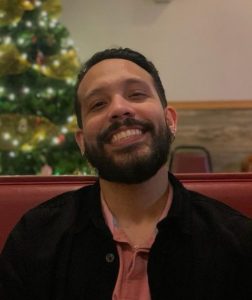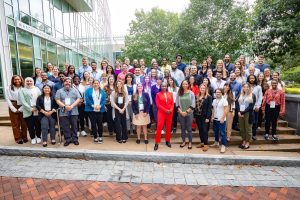ChemE Ph.D. student attends NextProf Nexus Conference and prevails at UF despite multiple challenges.

Victor Rivera-Llabres, a fifth-year Ph.D. candidate in the Department of Chemical Engineering, was nominated to be part of an elite group of scientific and academic leaders. On the surface, that’s impressive, but if you dig a little deeper, his rocky path to his goal of academia is truly astounding.
The group is called the NextProf Nexus, and they met at the University of Michigan (UM) for a three-day conference that’s part of a nationwide effort to strengthen and diversify the next generation of academic leaders in engineering and help prepare participants for faculty positions in academia, according to their website.
Rivera-Llabres was nominated by Carlos Rinaldi-Ramos, Ph.D., department chair, not only because of his academic and research successes in the Rinaldi Lab but also because “I think Victor has a very interesting personal story and he is a phenomenal mentor,” Rinaldi-Ramos explained.
Rivera-Llabres is originally from Puerto Rico and is studying the fabrication of aligned physical porosity in biomaterial scaffolds and their effect on cell migration. In layman’s terms, it’s like building a tiny scaffold, but instead of metal, it’s made of sponge-like material with holes arranged in specific patterns – such as in rows. If you had some tiny cells that needed to move around and do a job within this scaffold, you’d need to know how the pattern of the holes affects how the cells move. By observing how the cells move within this “sponge” scaffold, researchers can understand if the structure guides cell movement, akin to following a path, or obstructs it, similar to navigating a maze.
Rivera-Llabres was drawn toward a career in academia since before starting his Ph.D., but along the way, he battled imposter syndrome because his career path is one that “involves the process of being judged for your work.” However, he learned that feeling uncomfortable can be a predecessor to growth.

Rivera-Llabres said he found the NextProf Nexus program particularly beneficial because it helped him realize that others are going through similar struggles. The program exposed his cohort to everything from the academic hiring process to the research, teaching and service efforts that are expected from faculty members. The program brought in speakers who serve in various academic positions to discuss their careers and offer insights.
But the most helpful part was when the coordinators “got real about their careers,” Rivera-Llabres explained, including their best moments and their moments of self-doubt. As a result, the main point he gleaned from the long weekend was that he just needs to “go for it. That I can become faculty.” He added that your self-doubts don’t define you; they can be overcome. Despite being underrepresented, Rivera-Llabres said he can accomplish great things in this field because of his background and unique experiences.
Rivera-Llabres said a strong work-life balance helped him coexist with his passions for the technical, teaching and mentoring. Balancing the personal and professional was a necessity when confronted with a spate of health issues that might have derailed his college plans.
In 2021, he suffered from multiple health issues “that came pretty much out of nowhere.” A month before his proposal defense, he suffered from stress-induced shingles, which is unusual for someone his age. A few months later, he tested positive for COVID. But intense headaches and neck pain followed, and doctors discovered he had two rotated cervical vertebrae, which was dealt with thanks to chiropractic adjustments.
But that was not all. He started losing control of and sight in his right eye, caused by brain swelling. During an MRI, doctors discovered he was having a stroke from a small blood clot and ruptured vein in his brain. Yet he showed no symptoms of a stroke. No memory loss. No coordination or speech problems.
Medicine and months of physical therapy have helped him gain back strength, but due to the brain swelling and pressing on his eyes and optic nerves, he suffered cell death and permanent optic nerve damage. “I lost part of my vision, and there is no cure for it now,” he said.
The experience changed both his mental and physical life. He has had to learn new ways to utilize computers, the phone and other everyday digital tools. He has had to become adept and comfortable with driving with limited vision.
Despite his struggles, Rivera-Llabres was determined not to let these setbacks define him or prevent him from achieving his goals. To guide his forward movement through life, he adopted three key thoughts:
- “I embrace failures and the uncertainty that comes with life.”
- “If you know your ‘why’ it does not matter ‘how’ you accomplish it.”
- “Understand that sometimes you will not be motivated, but you will have to be self-disciplined to continue to grow and progress toward your goals and ambitions.”
Focusing on these phrases has kept him progressing in his academic career, publishing a journal article and a book chapter. He also focused more on helping others and has mentored 11 undergraduate students, as well as one high school student.
The desire to mentor is one of the key reasons that Rivera-Llabres was attracted to a career in academia, and he feels that mentoring through research is “a way I can contribute to society by shaping the minds of the future as well as providing guidance, experience and help to students who are still developing who they want to be.”
Rivera-Llabres has mastered the slow and steady approach needed to tackle setbacks and obstacles and he is close to achieving his goal of graduation this coming year. The same approach serves him in his spare time because he also practices the Japanese art of bonsai. This ancient art form involves the cultivation of miniature trees and requires years of patience by pruning and helping shape the branches with wires and encouraging them to grow in a particular way. It sounds like he is referring to his mentees when he says, “I love to see the tree grow in response to how I shape it.”
For more information about the NextProf Nexus program, visit: https://nextprof.engin.umich.edu/nextprof-nexus.
By: Ada Lang, ChemE Marketing & Communications Specialist
